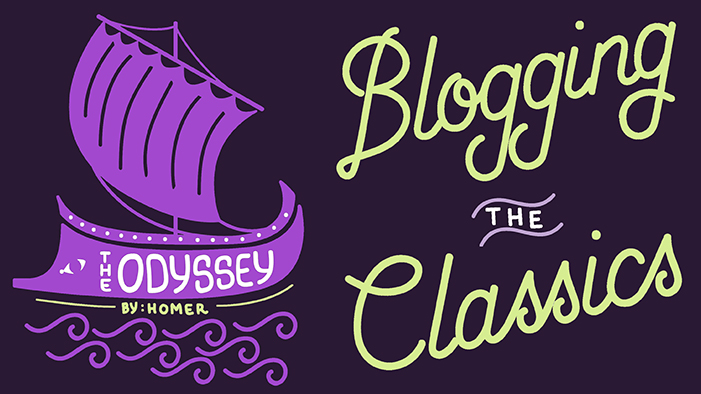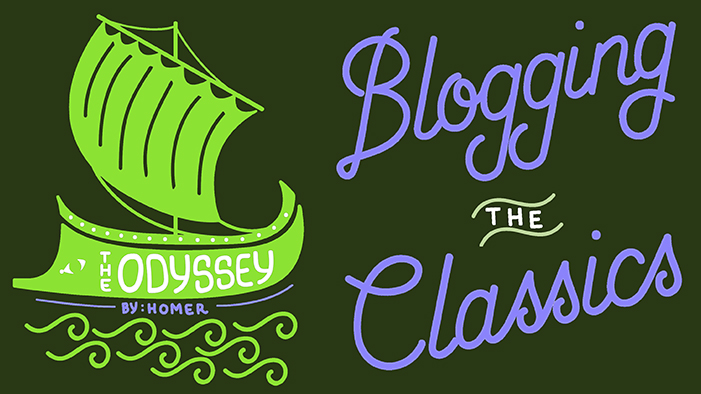Blogging The Odyssey: Part 8 (Odysseus is Back, and This Time It’s Personal)

Last time on Blogging The Odyssey, Odysseus finally finished telling his story. Presumably, this took the better part of twelve hours.
Of all the memes currently plaguing our various feeds and dashboards, my favorite would have to be the record scratch/freeze frame one because nothing has ever so perfectly and succinctly exemplified the concept of in media res. We’ve talked about this before, but for the uninitiated, it means that the story begins in the middle of the action, so like:
*record scratch*
*freeze frame*
Yup, that’s me. You’re probably wondering how I ended up in this situation.
 Wikimedia Commons
Wikimedia Commons
Or at least that’s what it would’ve looked like if Deadpool had written The Odyssey. For better or for worse, however, it was Homer who put pen to paper (or at least had someone else do it in his stead), and here I am 3,000 years later making jokes at the expense of our fallen heroes, most of whom died of things like “hubris” and “being an idiot.” Anyway, this week we’re just CRUISING forward, plot-wise.
Book 13: Ithaca At Last
Having finished his tale, Odysseus says he must be getting home. The king, undeterred by the way Odysseus singlehandedly wiped out his former crew, graciously offers him a new crew. They set sail. I was settling in for the long haul, but the biggest plot twist of this book thus far is that we are back in Ithaca within barely a paragraph.
Odysseus doesn’t yet know this. He’s asleep when the Phaeacians drop him off. They turn around and head back to Phaeacia, but as usual, Poseidon is being a big fussy baby about it.
POSEIDON: The mortals will never respect me now! I can’t believe those Phaeacians went behind my back and helped Odysseus even though I never explicitly told them not to!
ZEUS: So hit them with an earthquake or something. Whatever warms your heart.
“Whatever warms your heart” is an actual quote, which seems like important context given that Poseidon slaughters the Phaeacian crew in front of their friends and family. Ancient Greek culture is big on hospitality, or xenia, so I guess the life lesson of the week is “Always welcome strangers into your home, unless the gods are holding a grudge against them, in which case prepare to die at sea.”
When Odysseus wakes up, he doesn’t recognize his homeland and curses the Phaeacians for leaving him stranded in this undisclosed location. Apparently he thinks their whole diabolical plan was to deposit him on a beautiful beach, unharmed, surrounded by all his riches. Athena shows up and tells him they’re in Ithaca. She advises him not to reveal his identity to anyone. Probably a smart move. Agamemnon made that mistake, and where is he now? Toiling away in the underworld complaining about his wife is where.
Athena says she must now go and tell Odysseus’s son, Telemachus, to come home. She says, “The suitors are planning on murdering him, but will they? I don’t know, maybe.”
Book 14: The Loyal Swineherd
Odysseus stays with Eumaeus, a faithful servant who lives on the outskirts of the kingdom and tends to the livestock. Odysseus doesn’t reveal himself, however; he pretends to be a lowly beggar. He makes a lot of suspiciously obvious remarks about this King Odysseus fellow he’s heard so much about, like, “Is he handsome? I bet he’s handsome,” and “Was he popular with the people? When he was still alive, I mean. No reason, I’m just asking,” and “I heard Odysseus had an 8-pack. That Odysseus was shredded.”
 Disney
Disney
Eumaeus tells him about the whole suitor situation—that the palace has been repurposed into a frat house but the queen, Penelope, has remained faithful. Eumaeus doubts Odysseus is still alive. Presumably, Odysseus looks to the camera and winks.
Book 15: The Prince Sets Sail for Home
Athena finds Telemachus right where she left him: at the palace of Menelaus and Helen in Sparta. Even though this whole thing was her idea, Athena scolds him for being away so long and tells him to get his butt back to Ithaca stat. She doesn’t tell him his father is there waiting for him, because that would just be too easy.
As Telemachus is preparing to hoist the sails, a man named Theoclymenus approaches him and begs to hitch a ride. The conversation is something like
TELEMACHUS: I’m the son of Odysseus. I left my homeland to search for my father.
THEOCLYMENUS: Me too! Well, except instead of looking for my father I’m just a fugitive on the run from the law because I did a murder. Same thing, really.
This minor character sure came out of nowhere, but it probably bears mentioning that he’s the son of a famous prophet.
Speaking of which, not once but twice in this chapter-book does someone point out a large bird of prey carrying a smaller animal and proclaim it to be a sign that Odysseus has returned, which is weirdly specific. The first is an eagle carrying a goose. The second is a hawk with a struggling dove. Telemachus says he wishes this could be true but doubts very much that it is.
Once they reach the shores of Ithaca, Telemachus sends the crew (including Theoclymenus) onward to the palace. He himself knows he’ll be murdered by his mother’s suitors should he dare to approach the castle, so he takes a detour—straight to the hut of Eumaeus, where a certain lowly beggar is waiting to reunite with him. FINALLY.
Discussion questions:
- Why are people in this book so reluctant to believe in prophecies, particularly in a world where prophecies are a thing?
- Would the Phaeacians have gotten in trouble with Zeus, the god of hospitality, if they had turned Odysseus away? Were they stuck between a rock and a hard place here? (Between Scylla and Charybdis, you might say?)
- Theoclymenus is a hell of a name. I might just call him Theo. Cool?
Looking for the rest of our Blogging the Classics series? Check it out here! For all of Blogging The Odyssey, click here!















